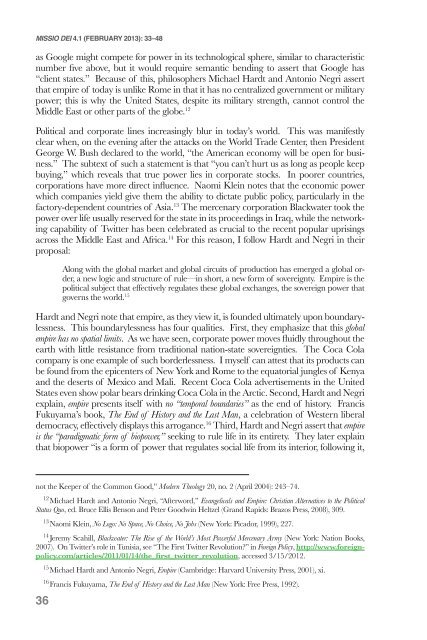VULNERABLE MISSION
VULNERABLE MISSION
VULNERABLE MISSION
Create successful ePaper yourself
Turn your PDF publications into a flip-book with our unique Google optimized e-Paper software.
MISSIO DEI 4.1 (FEBRUARY 2013): 33–48<br />
as Google might compete for power in its technological sphere, similar to characteristic<br />
number five above, but it would require semantic bending to assert that Google has<br />
“client states.” Because of this, philosophers Michael Hardt and Antonio Negri assert<br />
that empire of today is unlike Rome in that it has no centralized government or military<br />
power; this is why the United States, despite its military strength, cannot control the<br />
Middle East or other parts of the globe. 12<br />
Political and corporate lines increasingly blur in today’s world. This was manifestly<br />
clear when, on the evening after the attacks on the World Trade Center, then President<br />
George W. Bush declared to the world, “the American economy will be open for business.”<br />
The subtext of such a statement is that “you can’t hurt us as long as people keep<br />
buying,” which reveals that true power lies in corporate stocks. In poorer countries,<br />
corporations have more direct influence. Naomi Klein notes that the economic power<br />
which companies yield give them the ability to dictate public policy, particularly in the<br />
factory-dependent countries of Asia. 13 The mercenary corporation Blackwater took the<br />
power over life usually reserved for the state in its proceedings in Iraq, while the networking<br />
capability of Twitter has been celebrated as crucial to the recent popular uprisings<br />
across the Middle East and Africa. 14 For this reason, I follow Hardt and Negri in their<br />
proposal:<br />
36<br />
Along with the global market and global circuits of production has emerged a global order,<br />
a new logic and structure of rule—in short, a new form of sovereignty. Empire is the<br />
political subject that effectively regulates these global exchanges, the sovereign power that<br />
governs the world. 15<br />
Hardt and Negri note that empire, as they view it, is founded ultimately upon boundarylessness.<br />
This boundarylessness has four qualities. First, they emphasize that this global<br />
empire has no spatial limits. As we have seen, corporate power moves fluidly throughout the<br />
earth with little resistance from traditional nation-state sovereignties. The Coca Cola<br />
company is one example of such borderlessness. I myself can attest that its products can<br />
be found from the epicenters of New York and Rome to the equatorial jungles of Kenya<br />
and the deserts of Mexico and Mali. Recent Coca Cola advertisements in the United<br />
States even show polar bears drinking Coca Cola in the Arctic. Second, Hardt and Negri<br />
explain, empire presents itself with no “temporal boundaries” as the end of history. Francis<br />
Fukuyama’s book, The End of History and the Last Man, a celebration of Western liberal<br />
democracy, effectively displays this arrogance. 16 Third, Hardt and Negri assert that empire<br />
is the “paradigmatic form of biopower,” seeking to rule life in its entirety. They later explain<br />
that biopower “is a form of power that regulates social life from its interior, following it,<br />
not the Keeper of the Common Good,” Modern Theology 20, no. 2 (April 2004): 243–74.<br />
12 Michael Hardt and Antonio Negri, “Afterword,” Evangelicals and Empire: Christian Alternatives to the Political<br />
Status Quo, ed. Bruce Ellis Benson and Peter Goodwin Heltzel (Grand Rapids: Brazos Press, 2008), 309.<br />
13 Naomi Klein, No Logo: No Space, No Choice, No Jobs (New York: Picador, 1999), 227.<br />
14 Jeremy Scahill, Blackwater: The Rise of the World’s Most Powerful Mercenary Army (New York: Nation Books,<br />
2007). On Twitter’s role in Tunisia, see “The First Twitter Revolution?” in Foreign Policy, http://www.foreignpolicy.com/articles/2011/01/14/the_first_twitter_revolution,<br />
accessed 3/15/2012.<br />
15 Michael Hardt and Antonio Negri, Empire (Cambridge: Harvard University Press, 2001), xi.<br />
16 Francis Fukuyama, The End of History and the Last Man (New York: Free Press, 1992).


